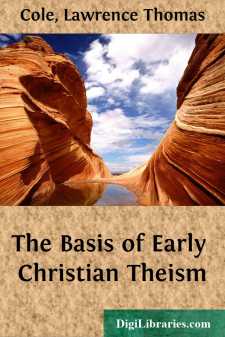Categories
- Antiques & Collectibles 13
- Architecture 36
- Art 48
- Bibles 22
- Biography & Autobiography 813
- Body, Mind & Spirit 142
- Business & Economics 28
- Children's Books 17
- Children's Fiction 14
- Computers 4
- Cooking 94
- Crafts & Hobbies 4
- Drama 346
- Education 46
- Family & Relationships 57
- Fiction 11829
- Games 19
- Gardening 17
- Health & Fitness 34
- History 1377
- House & Home 1
- Humor 147
- Juvenile Fiction 1873
- Juvenile Nonfiction 202
- Language Arts & Disciplines 88
- Law 16
- Literary Collections 686
- Literary Criticism 179
- Mathematics 13
- Medical 41
- Music 40
- Nature 179
- Non-Classifiable 1768
- Performing Arts 7
- Periodicals 1453
- Philosophy 64
- Photography 2
- Poetry 896
- Political Science 203
- Psychology 42
- Reference 154
- Religion 513
- Science 126
- Self-Help 84
- Social Science 81
- Sports & Recreation 34
- Study Aids 3
- Technology & Engineering 59
- Transportation 23
- Travel 463
- True Crime 29
The Basis of Early Christian Theism
Description:
Excerpt
CHAPTER I
INTRODUCTION
A question which every author ought to ask of himself before he sends forth his work, and one which must occur to every thoughtful reader, is the inquiry, Cui bono?—what justification has one for treating the subject at all, and why in the particular way which he has chosen? To the pertinency of this question to the present treatise the author has been deeply sensible, and therefore cannot forbear a few prefatory words of explanation of his object and method.
In accounts of the theistic argument, as in the history of philosophy in general, it has been customary to pass over a space of well-nigh ten centuries of the Christian era in silence, or with such scanty and unsympathetic notice as to make silence the better alternative. Largely through the influence of such treatment as this, we moderns have almost forgotten at times that during this period there lived men inferior to none in history in endowments of mind and influence on succeeding generations, and that there then took place some of the most significant and far-reaching intellectual conflicts in the history of thought. "With Cicero," says Professor Stirling, "we reached in our course a most important and critical halting-place.... We have still ... to wait those thousand years yet before Anselm shall arrive with what is to be named the new proof, the proof ontological, and during the entire interval it is the Fathers of the Church and their immediate followers who, in repetition of the old, or suggestion of the new, connect thinker with thinker, philosopher with philosopher, pagan with Christian." To attempt to account for even one of the details of thought during this period cannot be without its advantages.
For Christianity gave a new and unique turn to thought. It brought with it a new set of data, and a new subject-matter. The Christian doctrine of God, the distinctions in the Trinity, the great doctrines centering around the person of Jesus Christ, though, perhaps, faintly foreshadowed in some of the earlier speculations, are, in their fulness and completeness, first given to the world by the Founder of Christianity. The claims made for these doctrines, too, gave them a unique character. In contrast with the half-hearted, faltering conclusions of the prevalent philosophical schools, Christianity asserted that its teachings were absolute truth; it claimed to be nothing less than a revelation from the Creator of the world. It will be readily seen that the introduction of such a system as this into the Greek world would be attended with important results, not only in its effects upon the intellectual life of the times, but also in the influence of the current philosophical conceptions on the statement of its doctrine. The significance of this early period lies in the fact that, in the positive, definite system of Christianity, systematic thought, which was fast becoming disorganized and sceptical, found a center about which it might rally and focus itself, and the scattered fragments of philosophy were all collected together, by either friends or foes, about the new religion. The new point of view and the new relations would be most significant, too, in that department of thought with which the contact of this new central system had most to do, and thus the treatment of the theistic problem exhibits in a special degree the alteration in the standpoint and method of philosophy. It threw into bold relief the old basis of belief in the divine, and aroused a comparison and discussion of the validity of the various arguments hitherto used by speculative thought, and set them over in sharp contrast to the claims of the new revelation. In the early period when this contrast was most clearly felt, and time had not yet permitted a complete fusion and blending of the two points of view, we find a simplicity of situation which will aid analysis and facilitate the study of the relation of the old arguments for the existence of a God to the Christian doctrine, and which will help in determining the elements due to each and in interpreting the reasons for the direction of thought on this subject, which characterized the whole of the Mediæval period.
In the representations of early Christian thought, however, we find great differences in the emphasis laid upon the speculative side of the theistic problem. Christian philosophy is no exception to the rule that the thought of the race develops through the needs, temperaments and tendencies with which it comes into contact, and unfolds itself naturally in response to internal or external stimuli—the doubts, intellectual needs and growing consciousness and experience of the believer, and the cavils, objections and attacks of his opponent....


